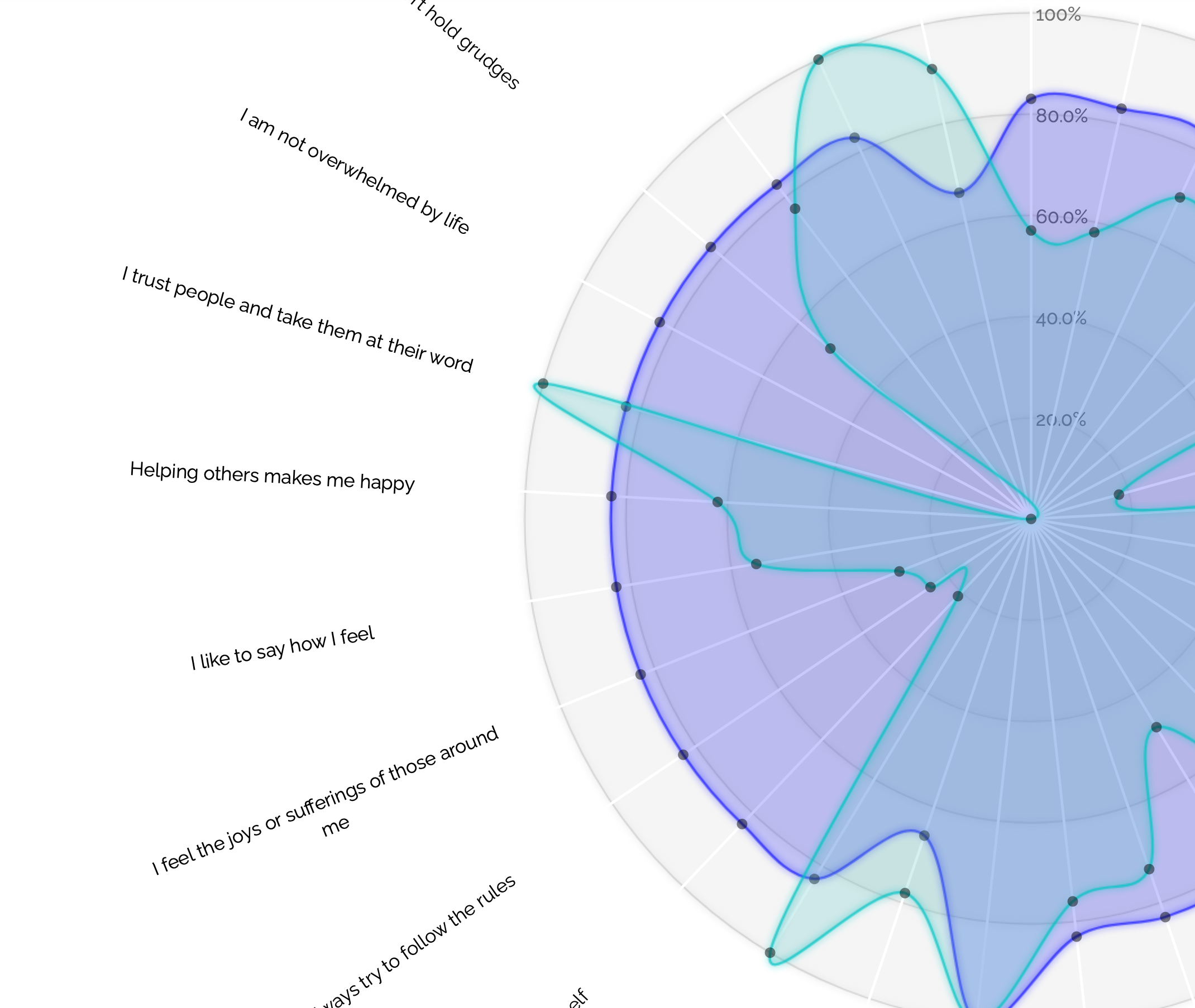Why Measuring Your Non-Conscious Attitudes is Critical for Self-Development
Our Openmind Psychometric Assessment Does Just That
In our journey toward self-improvement, much of our focus tends to center around consciously held beliefs, goals, and behaviors. We often rely on these to guide our actions and understand our motivations. However, a significant part of our attitudes and tendencies operates at a level that’s non-conscious, unseen yet influential in shaping our everyday behaviors and interactions. To gain a truly comprehensive understanding of ourselves, tapping into these non-conscious attitudes is crucial, as they offer insights that are often beyond the reach of introspection alone.
Non-conscious attitudes, or implicit attitudes, are formed from a lifetime of experiences, memories, and societal influences. Unlike explicit attitudes, which are conscious, deliberate, and often easy to articulate, non-conscious attitudes are automatic and instinctive, influencing our behavior subtly but powerfully. These attitudes are captured through tools like Openmind’s personality profiling, which examines both explicit and implicit dimensions to offer a layered understanding of personality.
Here, we’ll explore why measuring non-conscious attitudes is essential for personal growth and self-development. This understanding helps bridge the gap between how we perceive ourselves and how we are perceived by others, thus enhancing our self-awareness, authenticity, and emotional intelligence.
The Difference Between Explicit and Implicit Attitudes
Explicit attitudes are those we are aware of; they form the conscious part of our personalities and are easily shaped by rational thought and social norms. For instance, one might consciously recognize that patience is a virtue and aspire to embody it in daily interactions. Implicit attitudes, however, operate beneath the surface. They are formed over time through experiences, cultural conditioning, and associations, often revealing themselves in split-second responses and gut reactions.
A practical example is unconscious bias. Someone may have an explicit belief in equality and consciously reject prejudices. Yet, without realizing it, they might still display slight favoritism in certain interactions. Implicit attitudes create this dichotomy and often remain undetected unless measured and explored. Understanding them provides an honest, unfiltered view of our beliefs and reactions, leading to a deeper understanding of our behavior patterns and a better foundation for self-development.
The Impact of Non-Conscious Attitudes on Behavior
Our non-conscious attitudes significantly impact our reactions, choices, and interactions, particularly in high-stakes or emotionally charged situations. These attitudes can override our conscious intentions, resulting in behaviors that we may struggle to understand. For instance, a person who consciously believes in being open-minded might still exhibit resistance to new ideas in practice, as their non-conscious mind harbors a discomfort with change.
By examining the disparity between our implicit and explicit attitudes, we can identify areas where our behaviors deviate from our conscious values. This process not only enhances self-awareness but also empowers us to work on these areas, promoting growth that is authentic and sustainable. Understanding these attitudes is particularly valuable in professional settings, where subtle biases or emotional reactions can influence decisions, relationships, and leadership effectiveness.
Tools for Measuring Non-Conscious Attitudes
Traditional personality assessments, like the Big Five, focus on explicit self-reported traits. However, advanced tools like Openmind offer a novel approach by integrating implicit measurement. This tool records immediate, automatic responses to statements, capturing our instinctive, unfiltered reactions. For instance, Openmind might reveal that a person who explicitly identifies as highly organized subconsciously feels quite the opposite, highlighting an area ripe for development or reflection.
This dual-measurement approach helps individuals understand where they might be overestimating or underestimating their capabilities, enabling them to make adjustments in both personal and professional domains. Openmind’s emphasis on implicit attitudes thus provides a unique pathway to self-discovery, one that considers not just how we want to be seen but how we genuinely react under the surface.
Applications in Self-Development
The real value of measuring non-conscious attitudes lies in its practical applications. By examining the gaps between implicit and explicit attitudes, we can identify specific areas for self-improvement:
Enhancing Authenticity: Self-development requires authenticity. By recognizing and addressing discrepancies between our explicit and implicit attitudes, we can cultivate a more genuine approach to personal growth. For instance, someone who consciously values empathy but unconsciously struggles to relate to others can focus on bridging this gap, thereby fostering more authentic connections.
Building Emotional Intelligence: Emotional intelligence (EI) is about understanding and managing our emotions, as well as empathizing with others. Non-conscious attitudes often play a crucial role in how we perceive and react to others’ emotions. By becoming aware of these implicit biases or preferences, we can work towards a more nuanced, empathetic approach in our relationships.
Improving Decision-Making: Decisions are often influenced by unconscious biases or preferences. By identifying these through tools like Openmind, we can make more objective, well-rounded choices. For example, an individual who subconsciously avoids risks despite consciously viewing themselves as bold may reconsider certain career moves or personal goals.
Increasing Resilience: Many non-conscious attitudes stem from deep-seated fears or insecurities. By uncovering these implicit attitudes, individuals can better understand the sources of their anxiety or stress responses, allowing them to build resilience. For instance, someone who subconsciously feels overwhelmed by life may consciously work on stress-management strategies once they recognize this tendency.
Enhancing Self-Reflection: Finally, understanding non-conscious attitudes deepens the self-reflective process, helping us question not just “what” we believe but “why” we react the way we do. This reflective depth is invaluable for sustained personal growth, allowing us to continuously refine and align our conscious goals with our deeper, subconscious drivers.
Bridging the Gap Between Conscious and Non-Conscious Self
Non-conscious attitudes can create a cognitive dissonance that feels uncomfortable yet is often ignored or rationalized. Bridging this gap involves recognizing and accepting the disparities between our explicit and implicit selves. For example, if one realizes through a non-conscious measurement tool that they instinctively prioritize comfort over innovation, despite valuing creativity consciously, they can work towards understanding this reluctance to change and gradually build tolerance for discomfort in creative pursuits.
Achieving alignment between conscious and non-conscious attitudes doesn’t mean erasing implicit tendencies; rather, it involves integrating these insights into a more cohesive self-image. This harmonization enhances self-confidence and self-trust, as individuals feel more congruent and less conflicted in their goals and behaviors.
The Role of Non-Conscious Attitudes in Personal and Professional Relationships
Non-conscious attitudes don’t just affect personal growth; they play a significant role in our interactions with others. Implicit attitudes about trust, empathy, and assertiveness can profoundly influence relationships, sometimes undermining them in ways we’re not fully aware of. For instance, a person may consciously believe in fairness and equality yet demonstrate favoritism toward certain people. Recognizing this implicit bias allows them to address it directly, promoting more balanced and equitable relationships.
In professional contexts, implicit attitudes influence leadership style, team dynamics, and workplace culture. Leaders who understand their non-conscious tendencies are better equipped to model inclusive, supportive behaviors, as they become more aware of potential biases or emotional triggers. This awareness fosters trust and respect within teams, ultimately enhancing productivity and morale.
Moving Forward: Integrating Non-Conscious Insights for Lasting Change
Uncovering our non-conscious attitudes is just the beginning. Lasting change requires consistent effort to address and integrate these insights into daily life. Here are a few steps to make this integration process manageable and impactful:
Reflect Regularly: Periodic self-reflection on implicit and explicit attitudes allows individuals to track progress and make adjustments. Setting aside time for reflection ensures that these insights don’t just remain theoretical but lead to actionable changes.
Set Incremental Goals: Addressing deep-seated, non-conscious attitudes can be challenging. Setting incremental goals, such as practicing patience in specific situations or consciously embracing new ideas, makes the process manageable and keeps motivation high.
Seek Feedback: Close friends, family, or colleagues can provide valuable insights into how we are perceived by others, often offering a mirror to our non-conscious attitudes. This external perspective complements self-assessment, providing a fuller picture of areas for growth.
Embrace Vulnerability: Confronting non-conscious attitudes can feel uncomfortable. Embracing this vulnerability as a necessary part of growth allows us to let go of defensive reactions and be open to change, ultimately leading to a stronger and more authentic self.
The Future of Self-Development with Non-Conscious Attitudes
As technology advances, our ability to measure and interpret non-conscious attitudes will likely improve, offering even greater insights into human behavior and personality. Tools like Openmind’s personality profiling pave the way for a future where self-development integrates both conscious and non-conscious dimensions, enabling individuals to understand themselves in unprecedented ways.
This holistic approach to personality and behavior assessment stands to transform how we view personal growth, shifting the focus from a purely conscious endeavor to a more comprehensive, inclusive process. By incorporating these non-conscious insights, we not only become more self-aware but also more adaptable, resilient, and attuned to the underlying factors driving our behaviors.
Conclusion
Understanding and measuring non-conscious attitudes is not just an exercise in self-discovery; it’s a critical step in the path to meaningful, lasting self-development. By tapping into these implicit beliefs and reactions, we unlock a deeper layer of awareness, allowing us to address subconscious biases, bridge the gap between intention and action, and ultimately lead more authentic, balanced lives.
The journey to self-improvement is complex, and addressing non-conscious attitudes can feel like exploring uncharted territory. But as we become more attuned to these hidden aspects of ourselves, we open the door to personal growth that’s not just skin-deep. Embracing both our conscious and non-conscious selves allows us to build a foundation of authenticity, resilience, and emotional intelligence, equipping us to navigate life’s challenges with greater confidence and clarity.


